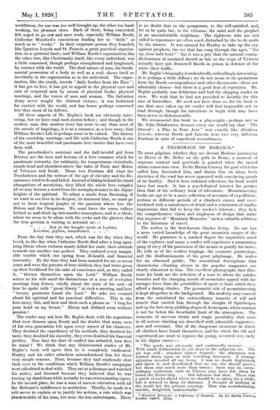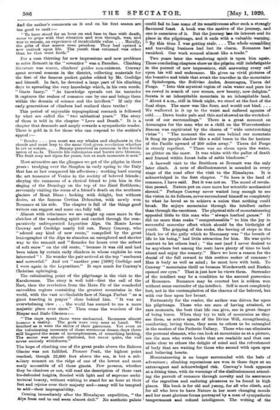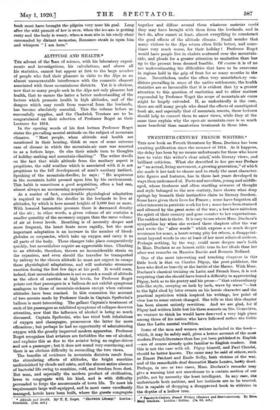A PILGRIMAGE OF ROMANCE.* To most pilgrims, whether they are
devout Moslems journeying to Mecca or Mr. Belloc on the path to Rome, a moment of supreme content and gratitude is granted when the sacred shrine comes into view. To Sir Martin Conway the goal which has called him, fascinated him, and drawn him on along fresh stretches of the road has never appeared with convincing proofs of its finality. Had it been ordained otherwise, his book would have lost much. It has a psychological interest far greater than that of the ordinary book of adventure. Mountaineering books are apt to be a mere collection of accounts of expeditions, written at different periods of a climber's career, and over- burdened with a minuteness of detail and a reiteration of similar impressions that fail to keep the reader's interest ; they lack the comprehensive vision and singleness of design that make this sequence of "Mountain Memories" such a valuable addition to the literature of travel.
The author is the beet-known climber living. No one has a more varied knowledge of the great mountain ranges of the world. He possesses in a marked degree the inquisitive mind of the explorer, and many a reader will experience a momentary pang of envy of his possession of the means to gratify his tastes. He tells us of the restless longings, the romantic journeying, and the disillusionments of his great pilgrimage. He writes for an educated public. The sensational descriptions that characterize climbing stories in the popular magazines are clearly abhorrent to him. The excellent photographs that illus- trate his book are the selection of a man to whom the subtler beauties and the changing moods of mountains appeal with far stronger force than the possibilities of sport or fame which they afford a daring climber. The gymnastic side of mountaineering is kept altogether in the background. His modesty may conceal from the uninitiated the extraordinary tenacity of will and muscle that carried him through the sloughs of Spitsbergen and up the last steep yielding slopes of Aconcagua, whose summit is not far below the breathable limit of the atmosphere. The moments of nervous strain and tragic possibility that arise in all serious climbing are described with admirable suggestive- ness and restraint. One of the dangerous situations in which all climbers have found themselves, and for which the old and experienced are wont to reprove the young, occurred very early in his Alpine career :—
" The guide was obviously and confessedly anxious. . . With much deliberation he cut steps in the subjacent ice. The air was still ; absolute silence reigned ; the afternoon sun burned down upon us with scorching fierceness. A strange agitation invaded all my being. I was no doubt frightened, and knew it, and determined that no one else should guess ; but there was much more than terror ; there was an extra- ordinary exaltation, such as Ulysses may have felt when he heard the Sirens sing. . . . Our advance was slow. There was a patch of rocks ahead where we should be in safety for a while, but it seemed to keep its distance. I thought of nothing in the world but the present emotion. That was overwhelming, terrible. delightful, indescribable."
• Mountain memories: a Pilgrimage of Annotate. By Bit Martin Conway, London : Camel Mad
And the author's comments on it and on his first season are
too good- to omit :— " To have stood for an hour on end, fate. to bee with death, come to grips with that situation. and_ won through, was, and was to remain, an experience of incalculable value.. . . M.orally, the gifts of that season were priceless. They had opened a new outlook upon life. The youth that returned. was other than he that went forth."
For a man thirsting for new impressions and new problems to solve Zermattin the "seventies" was a Paradise.. Climbing literature was scarce, climbers' guides non-existent. Conway spent several seasons, in the district, collecting materials for the first of the famous poeket. guides edited! by Mr. Coolidge and. himself. In fact, he devoted a large part of his climbing days to spreading the very knowledge which, in his own words. "blasts fancy." ".As knowledge spreads out its tentacles It captures the realms of romance one by one and brings them within the domain of science and the intellect." If only the early generations of climbers had realized these truths !
This period of enjoyable topographical research is followed by what are called the "two sabbatical years." The story
of them is told in the chapter "Love and Death." It is a chapter that demands and amply rewards a sympathetic reader. There is gold in it for those who can respond_ to the authbr's appeal:—
"Reader. . . you must see my whales and- elephants in the clouds and must leap to the same God-given revelation whether In art or nature.. . . Beauty, perceived in common is the fertile union of souls. Therein life culminates and bursts into blossom. The fruit may not ripen for years, but at such moments it sets."
Most attractive are the glimpses. we get of the pilgrim in these years : trudging over the Simplon in early spring to the Italy that has at last conquered his affections ; working hard among the art treasures of Venice in the society of beloved friends ; obeying the summons of a clerical friend to join him in the singing, of the Doxology on the top of the Zinal Rothhorn; reverently visiting the scene of a friend's death on. the southern glaciers of Mont Blanc ; looking with delight,. but without desire, at the famous Cortina Dolomites, with newly. won Romance at his aide. The chapter is full of the things good writers can suggest and none can fully tell.
• Almost with reluctance- we are caught up once more in. the clutches of the wandering spirit and carried, through the com- paratively unfrequented Lepontine Alps. On Monte Leone Conway and Coolidge nearly fell out. Haney Conway, who "adored any kind of new route," compelled. by the great lexicographer of the Alps to-abandon. an unexplored and shorter way to the summit and "flounder for hours over- the softest of soft snow" on the old route, "because it was old and had been taken by certain early climbers in whose exploits he was Interested" I No wonder the pair arrived at the top "sunburnt and sorrowful." And- yet "another year [1890] Coolidge and I were again, in the Depontines." It says much for Conway's Christian upbringing.
The culminating. point of the pilgrimage is. the visit to the Karakoram& The story. 13 well told—first the call of the East, then the revelation from the Hatu Fir of the wonderful untrodden regions containing the greatest mountains in the world, with the vast unclimbableface of Naugas Farhat "as a giant kneeling in prayer" close behind him. "it was an overwhelming view. . . the world has seemed to me a more majestic place ever since." Then come the wonders of the Hispar and Biafo Glaciers :—
" The. days spent there, were enchanted. Romance almost became a reality. The gods were very near at hand. We touched as it were the skirts of their garments. Yet even at the culminating moments of these strenuous dream-days there still lingered the sense of incompleteness, of something lacking. The secret was almost disclosed, but never quite, the veil never entirely withdrawn."
The hope of climbing one of the great peaks above the Baltoro Glacier was not fulfilled. Pioneer Peak, the highest point reached, though. 22,600 feet above the. sea, is but a sub- saliary summit on the ridge of one of the lowest and most easily accessible of all these giants. Few persons, whether they be climbers or not, will read the description of these vast ice-defended heights, flooded with light and of supreme archi- tectural beauty, without wishing to stand for an hour at their feet and rejoice over their majesty and—many will be tempted to add—their impregnability.
Coming immediately after the Himalayan expedition, "-the Alps- from end to end seem almost dull." No aesthetic palate could fail to lose some of its sensitiveness after such a strongly flavoured feast. A hook was . the motive- of the journey, and one is conscious; of it. But the journey. liaa its interest and its place in the pilgrimage, and it ends with a valuable warning. "-By thin- time I was getting stale. . . . The whole scrambling and travelling business had last its charm Romance had vanished. Our work seemed almost. like a trade."
Two yeses later the wandering spirit is upon him again. These concluding chapters show us the pilgrim, still indefatigable in the pursuit of new impressions, still answering every call upon his will and endurance. Be gives us vivid pictures of the beauties and trials that await the traveller in the mountains of Spitsbergen. the Bolivian Andras Aconcagua, Tierra del Fuego. "Into this mystical region of calm water and pure ice we rowed in search of new scenes, new beauty, new delights." Sorata is an inhospitable mountain in an inhospitable land. "About 4 a,sn., still in black night, we stood at the foot of the final slope. The snow was like flour, and would, not bind. . . . We wallowed in it up to the waist and. suffered agonies of cold. ... Dawn broke pale .and thin andshowed us the wretched- nese of our surroundings." There is a great moment on Aconcagua for the man who as a child on the Worcesterahire Beacon was captivated by the charm of "wide outstretching vistas " : "The moment the sun rose behind our mountain it flung its purple shadow- like a solid beam to the far horizon of the Pacific upward of 200 miles away." Tierra del Fuego is sternly repellent. "There was no sheen upon the water, no glitter on the snow. It was white with -the pallor of death and framed within forest belts of sable blackness."
A farewell visit to the Breithom at Zermatt was the only later climb. A note of disillusionment is sounded in every stage of the road after the visit to the Himalayas. It is acknowledged in the first chapter. "So here is the land of romance, I have said. But it was not so. The mood of revela- tion passed. Nature put on once more her scientific mechanical shroud." Perhaps Conway never waited long enough to see the vision in. its fullness, never surrendered himself so completely to what he loved as to achieve a union that nothing could break. He enjoys mountains through the intellect rather thrill through the emotions. The physical side of mountaineering appealed little to this man who" always loathed games." It did, no more than make " comprehensible " to him the joy in successful muscular effort which should - be the birthright of youth. The gripping of' the. rooks, the hewing of steps in the black ice of the gully which to Mummery was "the breath of life to his being," had little attraction for him. He. was quite content to let others lead ; "the rest (and I never desired to be anywhere but among the rest) have plenty of time to look about and enjoy the scenery." Have we here a reason for the denial of the full reward to this restless seeker of romance ? Man is body as well as mind ; he must love with both. To Conway "mountains thrill UB because Wordsworth and Ruskin opened our eyes." That is just how he. views them. Surrender of the intellect may be a condition to the assured possession of Romance. Romance may be courted but is seldom won without some surrender of the intellect. Self is most completely lost, not in the contemplation of the charms of the beloved, but with our face upon her breast.
Fortunately for the reader, the author was driven far upon his pilgrimage. Those who are sure of having attained, at rare moments, the best that. life can, give, axe in great danger of being bores. When they try to talk of mountains as they see them, as active agents of the Divine Will, strengthening, comforting, loving them, they seem to others to be entangled in the meshes of the Pathetic Fallacy. Those who can eliminate the personal element, who can look at mountains as at a picture, are the men who write books that are readable and that can make clear to others the delight of mind and the refreshment of body that are waiting for those who ascend with open eyes and believing hearts.
Mountaineering is no longer surrounded with the halo of adventure ; climbing reputations are won in these days at an extravagant and acknowledged risk. Conway's book appears at a fitting time, with its warnings of the disillusionment attend- ing the pursuit of romance through novelty and its assurance of the regretless and enduring pleasures to be found in high places. His book is for old and young, for all who climb, and for all who love to have Nature in her most changing moods and her most glorious forma portrayed by a man of sympathetic temperament and refined intelligence. The writing of the book must have brought the pilgrim very near his goal. Long after the wild pursuit of her is over, when the ice-axe is getting rusty and the body is weary, whenia man site in his study chair surrounded by distant memories, Romance steals in upon him and whispers "I am here."




































 Previous page
Previous page